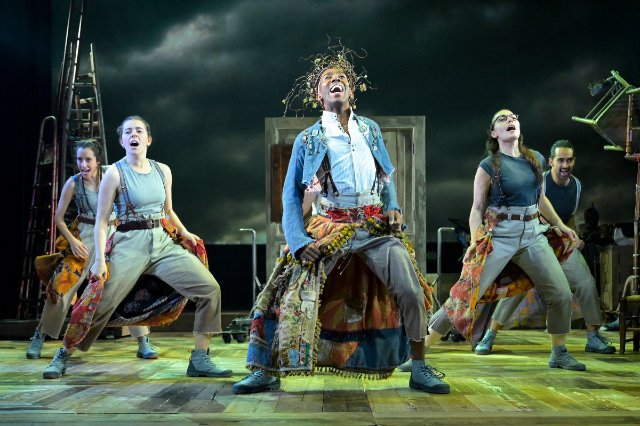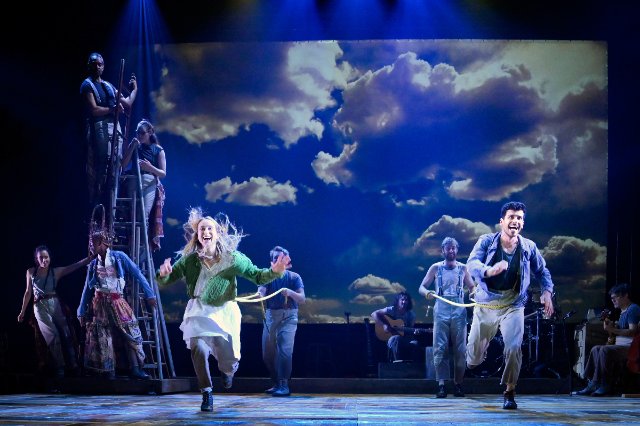Wuthering Heights
An irreverent Contemporary Musical Adaptation
By: Victor Cordell - Dec 02, 2022
A great many of today’s theater goers are “of a certain age.” They (ahem – we!) may have first experienced the original source material of Emily Brontë’s novel “Wuthering Heights” as a physical book in paper and ink as a teen or young adult. Most of us stage lovers cut our teeth on the silver screen, and our touchstone is the unsurpassable classic 1939 black-and-white film. Lawrence Olivier commanded the screen in an idol-making performance as the handsome, brooding Heathcliff, and the beautiful, conflicted Merle Oberon engendered our obloquy for making a mating decision based on the social standing of birthright rather than true love.
In my early years, I wondered why re-makes are made. I finally realized that it was rarely because the producers thought that a new version would be better, but that it would be different and would reach a new audience while making money, of course. So it is with Adaptor/Director Emma Rice’s stage interpretation of this tale of star-crossed love. This rendering must be measured by a very different yardstick than traditional versions. By a calculation based on contemporary sensibilities, Rice’s innovation succeeds in providing a multifaceted entertainment executed with top rate professionalism.
Although this Gothic novel is grounded in drama, the current version is flippant – a totally accomplished stage version that plays largely for wows and belly laughs. At first, it seems like it may be too silly. The opening sequence, when a Mr. Lockwood arrives at Wuthering Heights in the Yorkshire Moors during a storm, is so farcical as to be over-the-top. For instance, the visitor is held horizontally by other actors to simulate the effect of gale-force wind. Happily, the play settles into a merely raucous, but sustainable tone. Although many diversions are on display for entertainment value and to demonstrate irreverence, the narrative is pretty faithfully revealed.
The story is divulged in flashback. The brutish Heathcliff was abused by an adoptive family after the death of the kind head of household. Despite stepsister Catherine’s fractiousness, she and Heathcliff love one another, but because of his low status, she marries the landed Edgar. Unhappiness ensues for all.
The scene is set with action playing out on a bare stage having open wings. Minimal props, such as a free-standing door set, are wheeled in as needed. Actors wear an omnium gatherum of mostly contemporary rags (literally, as well as figuratively). As a plot device, a Greek chorus characterized as The Yorkshire Moors helps advance the story.
Consistent with the abstraction of the staging, animals are represented through puppetry operated on sticks by actors. Snapping skulls represent dogs, and flopping books act as birds. Another conceit used to humorous effect is portable blackboards. Why, you ask? The family histories are so convoluted and the deaths of characters so frequent that the visual notations in chalk help the viewer keep a scorecard.
A band of several, mostly string players, is scattered around the stage periphery throughout. Ian Ross’s always interesting original music helps propel the plotline. With an eclectic mix of British folk, pop, and other influences, it acts as a major driver in enlivening the feel of the production. Unfortunately, much nuance that the lyrics would provide is lost as they are often indecipherable.
Performances, including acting, singing, and dancing, are superb. However, many actors play multiple roles, so keeping characters straight is challenging. As Heathcliff, Liam Tamne cuts a striking figure. Swarthy and charismatic, he dominates his scenes as a sneering tiger of a man, relentless in his goals and contemptuous of obstacles. One curious affectation is that his voice is often Indian accented. And though a romanticized possible backstory suggests that Heathcliff may have been a lost young prince from an exotic land like India or China, he arrived in Yorkshire at an early age and would certainly have lost any previous accent.
Leah Brotherhead portrays his counterpart, and she stomps the stage as well. Her Catherine is no shrinking violet, but rather is demonstrative and tempestuous. The actor’s high energy extends to singing also, and Brotherhead possesses a dark and gruff vocal instrument that is put to good use.
Emma Rice’s distinction has arisen from innovative, subversive, and often inauthentic interpretations of literature. She is no stranger to Berkeley Rep, having imported and directed other productions, “The Wild Bride” being a personal favorite.
For those wanting something akin to past experience, be forewarned, this is not your father’s “Wuthering Heights.” To open Act 2, Heathcliff even breaks the fourth wall to ask, if not taunt, the audience with the question, “What did you expect?” This prompts the reflection that personal enjoyment often derives from how experience compares with expectation. Audience members who are unfamiliar with Brontë’s novel, as well as those who do know it but are willing to take a deep dive into a radical revision of “Wuthering Heights,” should find this a highly engaging evening.
“Wuthering Heights” is adapted by Emma Rice from the novel by Emily Brontë, presented by Berkeley Repertory Theatre and plays on its Roda Stage at 2025 Addison St., Berkeley, CA through January 1, 2023.





